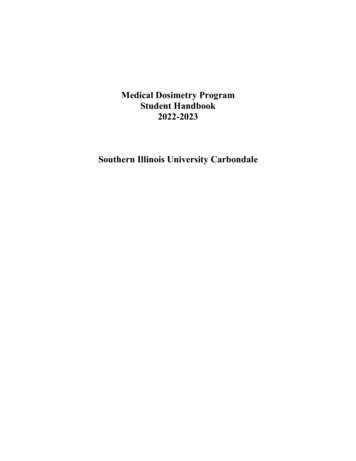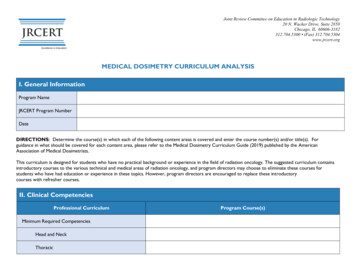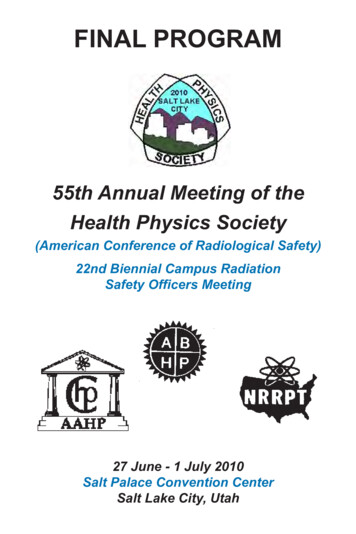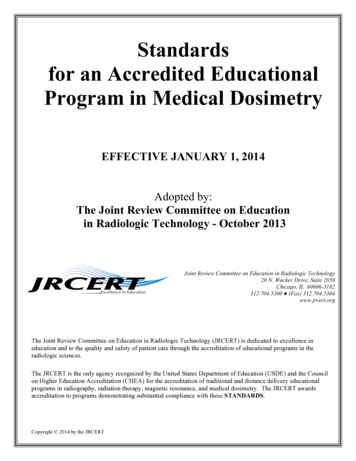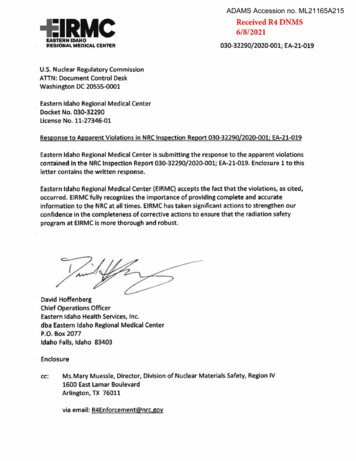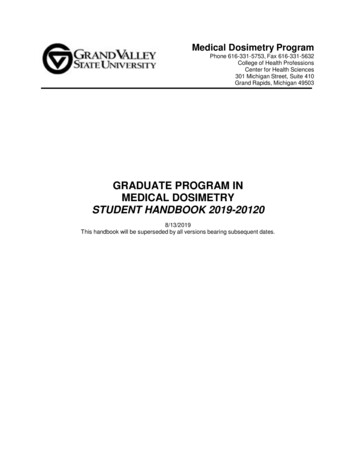
Transcription
Medical Dosimetry ProgramPhone 616-331-5753, Fax 616-331-5632College of Health ProfessionsCenter for Health Sciences301 Michigan Street, Suite 410Grand Rapids, Michigan 49503GRADUATE PROGRAM INMEDICAL DOSIMETRYSTUDENT HANDBOOK 2019-201208/13/2019This handbook will be superseded by all versions bearing subsequent dates.
TABLE OF CONTENTSI.II.III.IV.Mission Statement and Program Outcomes . 8Academics . 9Outside Employment . 9Standard of Achievement . 9Readmission . 12Clinical Education Centers . 12Clinical Education Attendance . 12Clinical Rotations Master Plan . 13Clinical Placements . 13Clinical Education Plan Correlation . 14Curriculum Sequence and Integration . 15Assignment of Rotations . 15Student Responsibilities . 16Student Direct Supervision . 16Student Clinical Education Schedules. 16Rotations . 16Scheduling . 17Record of Clinical Education Time . 18Absence from Clinical Rotation . 18Excused Absences . 20Unexcused Absences . 20Tardiness . 20Suspension . 17Strike Policy . 21Make Up Time . 21Vacations and Other Absences . 21Clinical Education Rules . 22Health Compliance . 22Clinical Conduct . 24American Association of Medical Dosimetrists Code of Ethics 25Patient s Bill of Rights . 26Dress Code . 29Grooming Rules . 29Name Badges . 30Incidents . 30Patients with Infectious Diseases . 30Students with Infectious Diseases . 30Health Services . 31Notices . 31Insurance . 31Malpractice . 31Health . 31Student Corrective Action . 32Dismissal from Clinical Education . 321
Student Grievance Procedure .Radiation Protection .State of Michigan Radiation Protection Rules .Personnel Monitoring .Pregnancy .Clinical Evaluation System .Clinical Grade Scale Chart .Description of Assignments and Assessment for Clinical Advising .Description of Assignments and Assessment .Clinical Course Syllabi .Program Curriculum Schedule .APPENDIX (Forms) .3335353637383940424747482
Medical Dosimetry ProgramPhone 616-331-5753, Fax 616-331-5632College of Health ProfessionsCenter for Health Sciences301 Michigan Street, Suite 410Grand Rapids, Michigan 49503ACKNOWLEDGMENT IN RECEIVING THE STUDENT HANDBOOKThis page is to be signed by the student and returned to the Program Director uponreceipt of this handbook.PREGNANCYTo assure the radiation safety of your baby in the event you become pregnant, pleaseread the Pregnancy Radiation Safety Policy carefully. If you wish to declare orundeclare a pregnancy, you must do so in writing according to the policies andprocedures in this handbook.STUDENT PHYSICAL EXAMINATION AND ASSOCIATED INFORMATION RELEASEI hereby give my permission for the release of my physical examination and associatedinformation (including but not limited to laboratory results and TB skin test results) to anyGVSU Medical Dosimetry clinical education center to which I am assigned. I realize that Imay rescind this permission by providing a written statement to that effect to the MedicalDosimetry Program Director/Educational Coordinator but understand that anyinformation previously released with my permission may be retained by the clinicaleducation center that received it.DateStudent SignaturePrinted NameUnder the Federal Family Educational Rights & Privacy Act of 1974 (BuckleyAmendment), students have the right to inspect and review any and all official records,files and data pertaining to them. Adequate and reasonable notice of intent to inspectmust be given and access may require the physical presence of a university official duringnormal operating hours.3
CRIMINAL RECORDSIndividuals who have been involved in a criminal proceeding or charged with or convicted of acrime may not be eligible for national certification by the Medical Dosimetry Certification Board.Because this certification is available to graduates of the medical dosimetry program as part ofpreparation for clinical practice, students to whom this may apply are strongly advised to workwith the MDCB for pre-application review of eligibility for certification from their website atwww.mdcb.org (Exam Information Tab). The MDCB may be contacted by phone at 856-4391631.ACCREDITATION AND NATIONAL BOARD EXAMINATIONSStudents who receive a M.S. degree in Medical Dosimetry from GVSU will be eligible for theMedical Dosimetrist Certification Board (MDCB).The program is accredited by the Joint Review Committee on Education in RadiologicTechnology (JRCERT). The program adheres to the standards which are posted on theirwebsite. You have the right to notify the JRCERT if you believe the university is not adhering tothese standards. The Standards are available for review at ards/. Additionally, a list of the current Standards can be found in theAppendix of this Handbook. The JRCERT may be contacted at 20 N. Wacker Dr. Suite 2850,Chicago, IL 60606 -3182, phone 312-704-5300 or www.jrcert.org.ANTI-DISCRIMINATION PolicyNote that the program adheres to university policies regarding student admission includingpolicies regarding anti-discrimination toward all persons (See the current UniversityUndergraduate and Graduate Catalog at http://www.gvsu.edu/catalog/ for policy details).The university policy is also described below:Grand Valley State University is an affirmative action, equal opportunity institution. It encourages diversity andprovides equal opportunity in education, employment, all of its programs, and the use of its facilities. It is committed toprotecting the constitutional and statutory civil rights of persons connected with the university.Unlawful acts of discrimination or harassment by members of the campus community are prohibited. In addition, evenif not illegal, acts are prohibited if they harass or discriminate against any university community member(s) throughinappropriate limitation of access to, or participation in, educational,employment, athletic, social, cultural, or other university activities on the basis of age, color, disability, familial status,height, marital status, national origin, political affiliation, race, religion, sex/gender, sexual orientation, veteran status,or weight. Limitations are lawful if they are: directly related to a legitimate university purpose, required by law, lawfullyrequired by a grant or contract between the university and the state or federal government, or addressing domesticpartner benefits.4
GRADING STANDARDSAll students pursuing degrees in GVSU medical imaging and radiation sciences are required toattain a minimum of B- or Pass (Credit) competency in all courses required for completion of theprofessional program. Students who fail to achieve this level of competency will be required torepeat all courses not meeting this standard and may be restricted from additional clinical coursesuntil the deficiency has been corrected. In addition, other courses with pre or co-requisites maynot be available to students until the deficiencies have been corrected.ACCESS TO CLINICAL EDUCATIONBecause the university has an obligation to assure clinical education centers that patient carestandards will not be compromised by students, no student will be allowed to continue in clinicaleducation if objectives from previous courses are not met. Note that this includes theachievement of satisfactory performance on clinical affective evaluations from self-assessmentas well as from clinical practitioners, preceptors, and instructors at educational sites and thedemonstration of professional behavioral development.I understand that all students are to be treated as students during clinical hours, even if theyare employees. The following list of requirements must be adhered to at all times from allstudents. If at any time these policies are violated, it will result in immediate dismissal fromthe program.1. Students are not allowed to “sign off” on any plans. This includes, but is not limited to,plans in the treatment planning system, electronic charts and paper charts. There mustalways be a supervising dosimetrists or physicist signing the plans.2. Clinical hours can only be in 1 section per day and a minimum of 4 hours. During thedesignated lunch time, students cannot work as employees. (Meaning students cannotgo back and forth between being an employee and student).3. Students cannot change from their submitted Clinical Education Schedule Worksheetwithout prior approval from both the program director and clinical instructor.4. Students may not receive compensation from the clinical education center asemployees during student clinical hours.RECEIPT OF STUDENT HANDBOOKI have received a copy of the current Student Handbook. It is my understanding that if I have anyquestions concerning material in this handbook I may contact any of the Grand Valley StateUniversity Medical Dosimetry faculty for further clarification. I understand and agree to thespecific clauses above but realize that I am responsible for all the information contained in thishandbook as well as any subsequent additions, and I will be expected to conform to itsprocedures during my enrollment in the program, including all clinical education.DateStudent SignaturePrinted Name5
Medical Dosimetry ProgramPhone 616-331-5753, Fax 616-331-5632College of Health ProfessionsCenter for Health Sciences301 Michigan Street, Suite 410Grand Rapids, Michigan 49503Statement of UnderstandingRegarding Clinical Education and Hybrid Course Meeting TravelBy my signature below, I acknowledge my understanding of the following programtravel requirements.I acknowledge my understanding that my clinical education may include assignment toclinical education sites not located within reasonable driving distance from GVSU'sCenter for Health Sciences due to a hybrid program format utilizing remote clinicalsites. Additionally, I understand that completion of assigned clinical hours does notinclude travel time and are my responsibility.While it is the intent of the university to assure beneficial clinical experiences withinreasonable travel distance for the student, the student should be aware that specialtravel accommodation is neither assured nor guaranteed.Additionally, I acknowledge my understanding that the program follows a hybrid formatthat requires students to attend face-to-face course meetings at predetermined timesduring each semester. While the university will work with the local community toassure the most reasonable financial cost to the student, it is the responsibility of thestudent to ensure that travel arrangements are made for attendance. Also, attendanceis mandatory at onsite hybrid course meetings to facilitate maximum educationalbenefit. Onsite course meetings may be located at GVSU campus or an affiliatedclinical site. Students will be given ample notice of meeting dates, times, and locationsfor onsite course meetings. Additional onsite meetings may be required for JRCERTaccreditation site visits.DateStudent SignaturePrinted Name6
Medical Dosimetry ProgramPhone 616-331-5753, Fax 616-331-5632College of Health ProfessionsCenter for Health Sciences301 Michigan Street, Suite 410Grand Rapids, Michigan 49503Statement of UnderstandingRegarding Clinical HoursBy my signature below, I acknowledge my understanding of the following programclinical requirements.I acknowledge my understanding that while I am documenting clinical hours I may notbe paid as an employee at the clinical site. Additionally, I understand that during thoseclinical hours I must adhere to the GVSU Medical Dosimetry Handbook and JRCERTregulations.I acknowledge my understanding that while documenting clinical hours I will adhere tothe JRCERT direct supervision policy. The JRCERT defines direct supervision asstudent supervision by a credentialed practitioner (e.g., registered radiation therapist,credentialed medical physicist, licensed radiation oncologist) during all aspects of theprocedure. All medical dosimetry calculations and treatment plans must be approvedby a credentialed practitioner prior to implementation. All treatment plans must bechecked before treatment delivery and a certified person must be in the room duringpatient contact. Direct patient contact procedures (e.g., simulation, fabrication ofimmobilization devices, mould room, etc.) must be also performed under the directsupervision of a credentialed practitioner. Under no circumstances shall any studentever provide indirectly supervised care or treatment of any patient.DateStudent SignaturePrinted Name7
I. MISSION STATEMENTThe program’s mission is to provide graduates with the knowledge, clinical skills, andprofessional behaviors for a career in Medical Dosimetry. The goals of the program areto graduate students who will:1.demonstrate clinical competence.2.communicate effectively.3.develop critical thinking and problem solving skills.4.demonstrate professional behavior in clinic and the profession.The program provides students opportunities to develop technical knowledge andpersonal skills necessary for a career in the radiation sciences. The curriculum isdesigned to combine compassion with integrity in order to shape a student into aprofessional. The program provides a unique learning environment which includes stateof the art equipment. By recruiting the help of highly qualified Radiation Oncologyfaculty, students acquire skills necessary to become successful Medical DosimetryProfessionals.Student Learning OutcomesThe students/graduates of the Medical Dosimetry program will be able to:1.apply didactic knowledge to treatment plans.2.generate clinically acceptable IMRT/VMAT treatment plans.3.communicate effectively with healthcare staff4.communicate effectively through written work.5.evaluate, critique, and recommend changes to the radiation therapy plan asnecessary.6.participate in the development of optimal treatment strategies.7.demonstrate professional behavior in the clinic.8.engage in the medical dosimetry profession.8
II. ACADEMICSAll students are also held to GVSU’s Graduate Education Policies and ProcedureManual found at .htmA.Outside EmploymentIf a student plans on engaging in employment in addition to participating as aMedical Dosimetry student, the program recommends a schedule of lessthan 30 hours per week. Students should remember that academic andclinical schedules will not be revised for their employment requirements.Additionally, students must be aware that they cannot be paid as employeesduring student clinical hours.B.Standards of Achievement1. For each program required course or discrete unit of instruction in theprofessional curriculum, a minimum proficiency level of 80 percent on all courseevaluations as described in each course syllabus is required. A minimum coursegrade of “B-” or higher is required for passing all RMD courses. In addition, theGPA must never drop below 3.0 in any semester or the student may be placedon academic probation or dismissed from the program. Demonstration ofcompletion of the 37 credits in the professional curriculum is required for thestudent to be granted the M.S. in Medical Dosimetry degree. General graduateacademic policies and regulations can be found -58.htm.2. Course Failure/ Repeats Policy in the Medical Dosimetry Program Courses atGVSU Courses required for completion of the professional program may berepeated only once. Clinical education that need to be repeated will be scheduled onlywhen clinical positions are available at sites with university clinicaleducation agreements.3. Required for the successful completion of all clinical and didactic courses foreach student is an available a laptop, webcam, microphone, and high speedinternet that can be utilized by the student for remote access. The laptop musthave virus protection, updated operating system, sufficient memory and be ableto contain CITRIX access software. The student will be required to access theInternet and utilize treatment planning software and GVSU University Blackboardfor assignment completion. You will also need a webcam, microphone andspeakers. A minimum screen resolution of 1920 x 1080 is required to see theentire Eclipse Treatment Planning program. The Medical Dosimetry Programuses Respondus Monitor for test, quizzes and exams.9
4. Course Waiver PolicyFrom the Graduate Education Policies & Procedure Manual: “Course waivers arenot acceptable in the Medical Dosimetry Program because nationally allprograms are autonomous and meet the Accreditation Standards set forth byJRCERT in unique ways. Because of each program‘s individuality anduniqueness, individual courses are not equal across institutions, so medicaldosimetry courses cannot be waived.”If an academic policy exception is made and cy-requests-56.htm), students muststill acquire the 37 credits required to graduate from the Medical DosimetryProgram.5. Academic Probation and Remediation PolicyA graduate student who does not achieve a course grade of “B-” or higher in aprogram required course, has a cumulative GPA fall below 3.0 in any semester,or when there is concern for the academic or professional behavior shall bereferred to the RMD Progress and Promotions Committee and is placed onacademic probation.Progress and Promotions (P&P) CommitteeThe purpose of the Progress and Promotions Committee is to monitor theprogress of students, both individually and collectively. The P&P Committee iscomprised of the Program Director and Educational Coordinator.The P&P Committee will assemble and then contact the student in question todiscuss the issues at hand. The P&P Committee will generate a written accountof the meeting and the circumstances under which the meeting was convened.The Program Director will then write a letter to the student detailing the plan forremediation or dismissal.Probation and RemediationDefinition: Probation is a status that can be assigned to students who have hadacademic or professional (behavioral) problems and have been referred to P&PCommittee for disciplinary action.10
Procedure:i.ii.iii.Students who are placed on probation due to inadequate performance in one ormore courses will be required to do remedial work or retake those courses. Theopportunity to remediate will be decided by the instructor of the course. Theinstructor has the option to deny remedial work in which case the student will berequired to retake the course. Once the student satisfactorily completes remedialwork or retakes the course, the student may proceed in the program. However,the probationary status will extend, at a minimum, to the end of the followingsemester.Students who are placed on probation due to behavioral problems may berequired to do assignments, classes, or other educational courses outside of theRMD curriculum if felt appropriate by the P&P Committee and/or the DepartmentChair.When a student is placed on probation, the Program Director in conjunction withthe Educational Coordinator will draw up a contract which outlines the steps to befollowed by the student to be taken off probation. The contract will be signed bythe student and the Program Director. During the period of probation, theProgram Director or Educational Coordinator will monitor the student’s progress;however the student is ultimately responsible for completion of the terms of theremediation plan.The above policy does not constitute grounds for university probation, but onlyapplies to the Medical Dosimetry Program. Program probationary documents willnot become part of a student’s university record on student transcripts.Grounds for Dismissal:Any one of the following items may constitute grounds for dismissal from theprogram:i.ii.iii.Two consecutive semesters of probation.Failure to complete remedial work, as specified in the remediation contract.Evidence of unethical or illegal behavior.Procedure:i.The Progress & Promotions Committee will be called in session for any studentin danger of dismissal from the program.ii.The committee will review all of the information available regarding the studentand determine if the student meets the criteria for dismissal. The finaldecision regarding dismissal will be made by the Program Director.Appeal Process:Should a student decide to appeal a decision for dismissal, the student must11
submit a written appeal to the Program Director within 30 days after receiving theletter of dismissal. The defense should contain any new information which thestudent may have and a clarification of old information. The defense will beconsidered by the Program Director in consultation with the EducationalCoordinator within 15 days of receipt of the appeal letter and a decision given tothe student. If the student is still not in agreement with the plan, then the studentmay elect to appeal their dismissal. Refer to the University Catalog StudentAcademic Grievance Procedures for further details.C.D.ReadmissionReadmission to the program requires the dismissed student to complete theMedical Dosimetry application process according to the procedures and policiesin effect at the time of the application.Professional CertificationWhile not required, the university expects students to sit for the MDCB MedicalDosimetry examination. It is difficult to practice Medical Dosimetry without theappropriate professional registration. More information on these examinationsand your eligibility is available at www.MDCB.org.III. CLINICAL EDUCATION CENTERSThe Grand Valley State University Radiologic and Imaging Sciences Departmentis currently affiliated with a number of Clinical Education Centers. Students maybe required to change clinical site rotations throughout the program as needed toassure a comprehensive learning experience. Clinical placement will bedetermined by the program director and educational coordinator in consultationwith the student.IV.CLINICAL EDUCATION ATTENDANCEA.Students are expected to attend clinical education each week as specified.Students are expected to adhere to a schedule consistent with the expectationsof the clinical education center and will depend on whether the student hasselected full-time or part-time options. All students must fill out the ClinicalEducation Schedule Worksheet. Exact start and end times, lunch and breakschedules, etc. are determined by the clinical education center, and thus mayvary by the day, the center, and the semester. Lunch breaks do not counttowards clinical hours. Clinical education centers are expected to schedulestudents for clinical hours for attainment of academic credit as specified by theprogram. Clinical experience hours must not exceed 10 hours per day and thetotal didactic and clinical involvement to not more than 40 hours/week at any time.Students may not receive compensation from the clinical education center as12
employees during student clinical hours.B.All students are to be treated as students during clinical hours, even if they areemployees. The following list of requirements must be adhered to at all timesfrom all students. If at any time these policies are violated, it will result inimmediate dismissal from the program.1. Students are not allowed to “sign off” on any plans. This includes, but is notlimited to, plans in the treatment planning system, electronic charts and papercharts. There must always be a supervising dosimetrists or physicist signingthe plans.2. Clinical hours can only be in 1 section per day and a minimum of 4 hours.During the designated lunch time, students cannot work as employees.(Meaning students cannot go back and forth between being an employee andstudent).3. Students cannot change from their submitted Clinical Education ScheduleWorksheet without prior approval from both the program director and clinicalinstructor.4. Students may not receive compensation from the clinical education centeras employees during student clinical hours.C.Part-time students enroll for the full clinical course, and will receive an “I”(incomplete) grade at the end of the semester. The grade will be changed to aletter grade once the part-time student completes the course requirements(hours, mandatory competencies, assignments, etc). Students may use thedays in-between semesters to make-up missing clinical hours, but may notuse the days in-between semesters to bank clinical hours for the nextsemester (same as all other students).13
CLINICAL ROTATION MASTER PLAN(Full-time Option) 1st term (Aug-December) - 14 weeks x 3 days per week x 8 hrs per day 336 clinicalcontact hours (42 days) 2nd term (Jan-April) -14 weeks x 4 days per week x 8 hrs per day 448 clinicalcontact hours (56 days) 3rd term (May-August)- 12 weeks x 4 days per week x 8 hrs per day 384 clinicalcontact hours (48 days) 4th term (optional) - additional available time for students who have not completed allmandatory competencies or who require clinical support for theses/projectsTotal 1168 clinical contact hours (146 days or 7.5 months of full time experience)Additional clinical education may be required if all mandatory competencies are notachieved in three semesters for full-time students or the equivalent for part-timestudents. Part time clinical education can be no less than half the hours of the full timeoption. These hours must be approved by the educational coordinator and programdirector prior to class registration. 8 clinical hours per week equals 1 semester credit.B.CLINICAL PLACEMENTS1. Students are informed in advance of the assigned site of clinical rotation. Thisschedule is distributed to students and the Clinical Education Centers. Thisschedule is at the discretion of GVSU faculty.2. Clinical faculty at the clinical education centers determine the student rotations ata particular institution based on direction from the university. Clinical Instructorsmay adjust the student schedule according to departmen
Medical Dosimetry Program. Phone 616-331-5753, Fax 616-331-5632 . College of Health Professions . Center for Health Sciences . 301 Michigan Street, Suite 410 . Grand Rapids, Michigan 49503 . GRADUATE PROGRAM IN MEDICAL DOSIMETRY STUDENT HANDBOOK 2019-20120. 8/13/2019 . This handbook will be superseded by all versions bearing subsequent dates.
